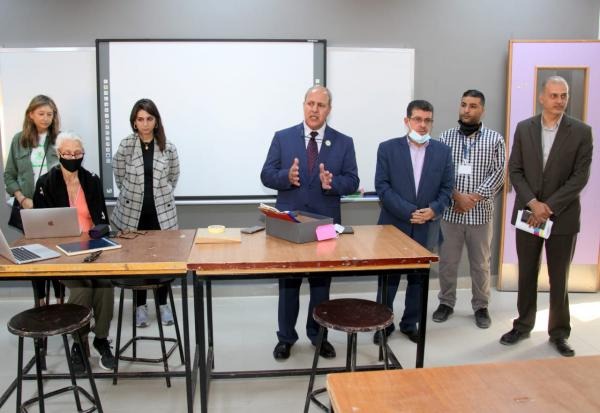Al-Mahasneh sponsors the inauguration of the personal protective equipment project to face Corona epidemic

Prof. Bassam Al-Mahasneh, Vice President of Al
al-Bayt University for Quality and Development, stated that the project is part
of the University's activities in collaboration with the High Commissioner for
Syrian Refugees as well as Jordanian and international academic institutions,
indicating that the University offers all its potentials to facilitate this
project.
The Director of International Relations and Project
Manager at the University, Dr. Moayyad Al-Shawaqfeh, displayed that this
project will benefit approximately 65 volunteers from Syrian refugees in and
outside Al-Zaatari camp in Al-Mafraq, as well as Jordanian volunteers. The
training will last for approximately two weeks, during which the participants
will acquire various skills in the responsibility of personal protection.
Dr. Muhannad Mass’ad indicated that the project is
divided into three parts. The first aims to preserve the environment and face
the burdens of Corona through the manufacture of sterilization materials and
personal protection equipment. It also aims to make the University a green area
and improve livelihoods through training in hydroponics on campus.
Dr. Najah Al-Shanableh manifested that the digital
aspect, which is the second part, is related to training volunteers in the
digital team on full computer software to serve the community. It is also
concerned with training in conducting research, data analysis, and electronic
marketing through social media.
Dr. Aya Mismar, who is in charge of the social work
team in the project, explained that the third part considers training in the
means of practicing participatory social research and patterns of social
behavior using the place according to Corona pandemic.
It is worth noting that this project, in which Dr. Helena, the project
manager from the University of London, on behalf of Dr. Tony from the
University of Sheffield in Britain, is implemented in cooperation with the
University of Sheffield, the University of Petra, and the High Commissioner for
Syrian Refugees. It will last six months and will be implemented on campus. It
aims to respond quickly to the consequences of Corona pandemic by implementing
community initiatives to solve problems and improve the living environment.